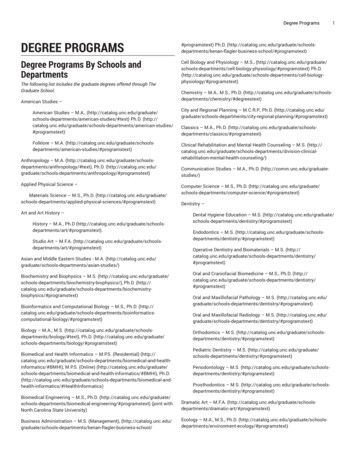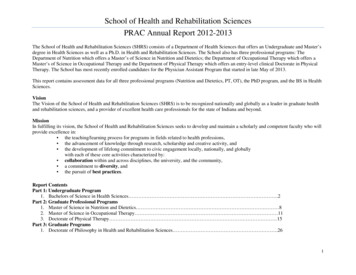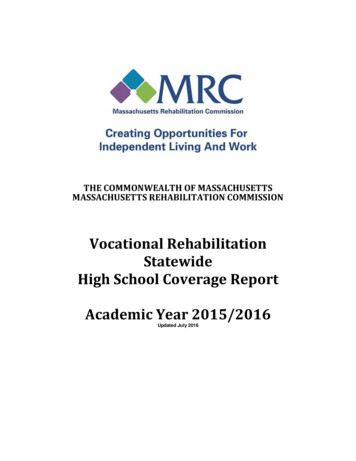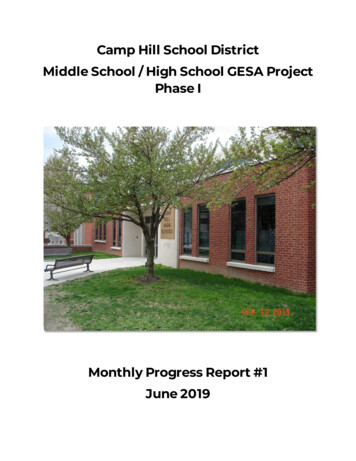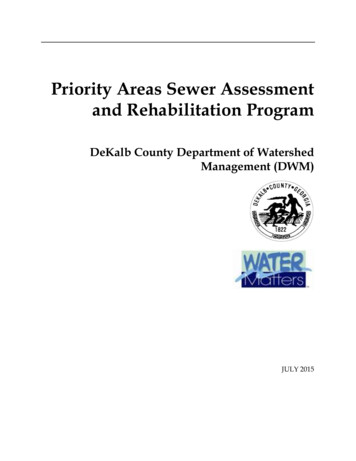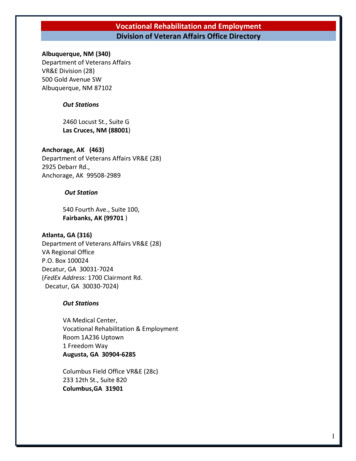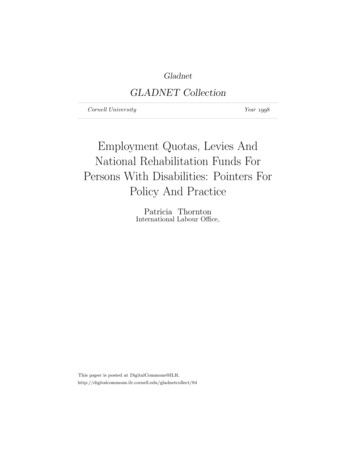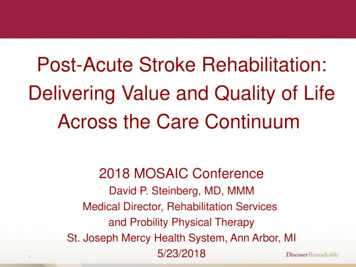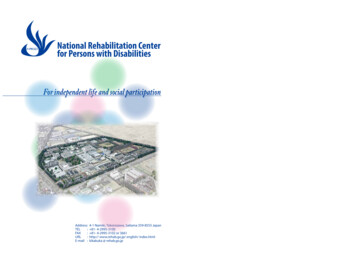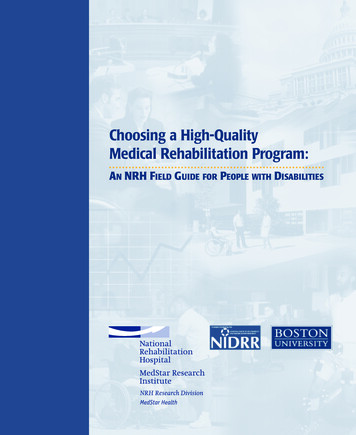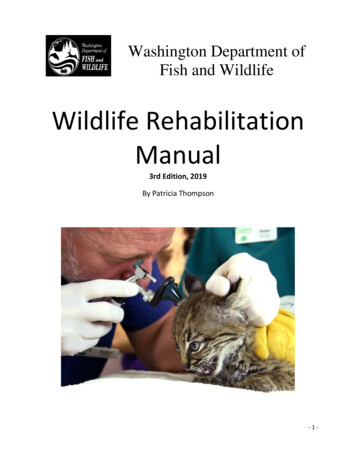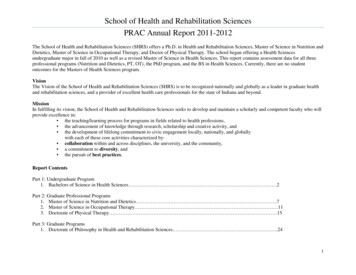
Transcription
School of Health and Rehabilitation SciencesPRAC Annual Report 2011-2012The School of Health and Rehabilitation Sciences (SHRS) offers a Ph.D. in Health and Rehabilitation Sciences, Master of Science in Nutrition andDietetics, Master of Science in Occupational Therapy, and Doctor of Physical Therapy. The school began offering a Health Sciencesundergraduate major in fall of 2010 as well as a revised Master of Science in Health Sciences. This report contains assessment data for all threeprofessional programs (Nutrition and Dietetics, PT, OT), the PhD program, and the BS in Health Sciences. Currently, there are no studentoutcomes for the Masters of Health Sciences program.VisionThe Vision of the School of Health and Rehabilitation Sciences (SHRS) is to be recognized nationally and globally as a leader in graduate healthand rehabilitation sciences, and a provider of excellent health care professionals for the state of Indiana and beyond.MissionIn fulfilling its vision, the School of Health and Rehabilitation Sciences seeks to develop and maintain a scholarly and competent faculty who willprovide excellence in: the teaching/learning process for programs in fields related to health professions, the advancement of knowledge through research, scholarship and creative activity, and the development of lifelong commitment to civic engagement locally, nationally, and globallywith each of these core activities characterized by: collaboration within and across disciplines, the university, and the community, a commitment to diversity, and the pursuit of best practices.Report ContentsPart 1: Undergraduate Program1. Bachelors of Science in Health Sciences 2Part 2: Graduate Professional Programs1. Master of Science in Nutrition and Dietetics .72. Master of Science in Occupational Therapy 113. Doctorate of Physical Therapy 15Part 3: Graduate Programs1. Doctorate of Philosophy in Health and Rehabilitation Sciences .241
School of Health and Rehabilitation SciencesPRAC Annual Report 2011-2012Part 1: Bachelor of Science in Health Sciences DegreeDepartment of Health SciencesMission: To prepare students at the baccalaureate level for advanced study and employment opportunities in the health sciences.Report Overview: The data below marks the first evaluation of the newly formed Health Sciences undergraduate program. The reportoutlines the three specific learning domains, their relationship to the PULs and specific learning objectives for each domain. Learningassessment techniques are provided as well as the benchmarks set by the department for each learning outcome. The most recentstudent outcome data appears in the outcome column and suggested changes for improvement for 2012-2013 are listed in the finalcolumn. This report represents the first analysis for the program; consequently, no follow up outcomes to the changes are reported.LEARNINGBUNDLEDomain I :Knowledge ofhealth careservices in theworld,populationhealth needs,and healthsciencesPULs1A – Express andinterpretinformation1C – Useinformationresourcesandtechnology2 - Criticalthinking3 – Integrationand application ofknowledge.5 – Understandingsociety meChangesStudents will be able to:1. Describe health care professionaljobs. (W100)Healthprofessiondescription paper90% earn 35points or better57%Evaluated course content andrequirements and madecourse content changes2.Describe the inter-relationshipsbetween culture and disabilities.(W110)Final exam90% earn 70points or better38% Fall46% SpringChanged course from 100level to 300 level.3.Identify current issues of criticalimportance in the allied healthprofessions. (W210)Exam #290% earn 63points or better57%Provide to students an essayexam rubric prior to exam4.Describe the roles andresponsibilities ofhealth professionals. (W211)Career paper90 % earn 70points or better91%Currently met benchmark,will continue to monitorcompetency5.Identify major global healthchallenges. (W250)Final Exam90% earn 42points or better78%Revise course instructions.Revise test items. Useaudiovisual materials toemphasize key concepts.2
School of Health and Rehabilitation SciencesPRAC Annual Report 2011-2012Provide study guides for midterm & final exams. Add oneopen forum for Q&A prior tofinal exam.6.Compare and contrast healthprofessions globally. (W270)Final paper90% earn 35points or better50%7.Demonstrate critical thinking &reflection on controversial issuessurrounding aging & healthcare.(W310)Response papers90% perform at90th percentile75%8.Explain the technology used inrehab. settings. (W320)Final paper90% earn 17points of better83%Schedule a video chat forQ&A prior to exam.Describe different types ofdisabilities and successful copingstrategies. (W340)History &Theories paperFinal paper90% earn 7points or better100%9.Currently met benchmark,will continue to monitorcompetencyFinal paper90% earn 105points or better93%Currently met benchmark,will continue to monitorcompetency11. Describe diverse populations interms of values and perspectivesrelated to culture, behaviors andpractices. (W361)Final paper90% earn 70points or better39%No specific change made atthis time but will continue tomonitor performance12. Describe the impact of policies,laws, and regulations on healthand health care setting andproviders. (W362)Final paper90% earn 42points or better89%Provide students a gradingrubric to use for selfassessment prior tosubmitting paper.13. Describe application ofethical/moral principles. (W363)Final exam90% earn 40points or better80%No specific change made atthis time but will continue to10. Demonstrate knowledgeregarding community resourcesfor older adults. (W350)Provide a grading rubric touse for self-assessment priorto submitting paperNo specific change made atthis time but will continue tomonitor performance3
School of Health and Rehabilitation SciencesPRAC Annual Report 2011-2012monitor performanceDomain II :PracticalSkills andAbilities1A – Express andinterpretinformation1C – Useinformationresources andtechnology2 – Criticalthinking3 – Integrationand14. Explain the relationship ofsocietal circumstances onindividuals with disabilities.(W364)Final Quiz90% earn 14points or better80%Add open forum for Q&Aone week prior to final quiz15. Explain adult development andthe aging process. ((W370)Final exam90% earn 14points or bett90%16. Describe health professionalspracticing in developingcountries. (W380)Final paper90% earn 35points or better50%Add study guide to studentmaterials; add one openforum for Q &A one week prior to exam.Provide students a gradingrubric to use for selfassessment prior tosubmitting paper.17. Describe theories ofadministration and leadership inrehab. services. (W441)Final Paper90% earn 42points or better75%Provide students a gradingrubric to use for selfassessment prior tosubmitting paper.18. Explain relationship of aging onsocial functions. (W450)Portfolio90% earn 28points or better62%Provide Students with agrading rubric to use for selfassessment prior tosubmitting portfolio1.Evaluate the variation ofoperations among various healthfacilities. (W410)Agency paper90% earn 105points or better90%Currently met benchmark,will continue to monitorcompetency2.Write a grant. (W420)Proposal critiquepaper90% earn 87points or better71%Provide to students a gradingrubric for paper3.Access and assess health care dataand other health servicesinformation presented in graphs,charts, tables and diagrams.Annotated bib.90% earn 24points or better82%No specific change made atthis time but will continue tomonitor performance4
School of Health and Rehabilitation SciencesPRAC Annual Report 2011-2012application ofknowledge4 – Intellectualdepth, breadth,andadaptiveness(W4424.5. Recognize, analyze, and evaluatehealth careservices. (W445)Evaluation planpaper90% earn70points or better100%Currently met benchmark,will continue to monitorcompetencyConduct literature searches onhealth topics. (W362;W270;W380;W441;W450)Compare & contrast US healthcare system with that of a countryvisited. (470)Journal reports80% earn totalpoints for eachreport for eachcourse38%23%33%56%33%Provide grading rubrics tostudents to self-assessreports.Final paper90% perform at90th percentileNo dataavailableWill report when dataanalyzed1.Demonstrate properdocumentation in all writtenpapers; avoid plagiarism.All course papersNo of incidentsreported to bezeroOnestudent2.Demonstrate honest actions incompleting assignments andtaking exams; avoid cheating.Courseassignment andexamsNo of incidentsreported to bezero2 studentsin onecourse3.Maintain a CGPA greater than2.0; avoid probation.CGPAInsert additional informationinto Student Handbook. Allfaculty to emphasize insyllabi and classroomdiscussion. Require all newstudents to take the on-lineplagiarism quizAll syllabi to containincreased emphasis andstatements on cheating.Expand emphasis in StudentHandbook. Expand emphasisin new student orientation.Increase outreach efforts tostudents to attend probationmeetings with academiccounselor.Change policy: For GPA 2.0 for one semester,student receives warning not6.International StudyAbroadDomain III:5 – Values andethics7.Responsibilities andPerformance10% or less onprobation for asemester8% Fall8% Spring5
School of Health and Rehabilitation SciencesPRAC Annual Report 2011-2012probation letter.Change admission criteriastarting 2013 and changetransfer in criteriaimmediately.4.Maintain enrollment in Programuntil graduation; avoid dismissal.CGPA1 % or lessdismissed fromthe program0.6%dismissedCurrently met benchmark,will continue to monitorcompetency5.Achieve high academic standardof 3.5 GPA each semester.Semester GPA5% or greaterplaced onDean’s List9% Fall8% SpringCurrently met benchmark,will continue to monitorcompetencyReview SummaryThe Health Science program demonstrated learning outcomes approaching targeted benchmarks. The faculty have outlined changes to includedifferent active learning activities (audiovisual materials), self-assessment strategies, grading rubrics, and policy changes to help students achievelearning outcomes. Follow up findings evaluating the impact of these changes will be reported next year.6
School of Health and Rehabilitation SciencesPRAC Annual Report 2011-2012Part 2: Graduate Professional ProgramsIUPUI recently adopted the principles of graduate learning which are listed below for both graduate and professional programs. Each of thesegoals is highly correlated to existing program goals for all disciplines within the School. Consequently, each of the goals below is numbered andlinked to existing goals within each assessment data table. Goal association is marked as PGL (Principles of graduate learning) and then thecorresponding number.Principles of Graduate and Professional LearningGraduate students earning an Indiana University or Purdue University Ph.D. on the IUPUI campus will demonstrate the followingabilities related to the research focus of the degree:1. Demonstrate the knowledge and skills necessary to identify and conduct original research, scholarship or other creative endeavorsappropriate to the field2. Communicate effectively high level information from their field of study3. Think critically and creatively to solve problems in their field of study4. Conduct research in an ethical and responsible mannerGraduate students in professional graduate programs on the IUPUI campus will demonstrate the following abilities:1. Demonstrate the knowledge and skills needed to meet disciplinary standards of performance, as stated for each individual degree2. Communicate effectively with their peers, their clientele, and the general public3. Think critically and creatively to improve practice in their field4. Meet all ethical standards established for the discipline7
School of Health and Rehabilitation SciencesPRAC Annual Report 2011-2012Department of Nutrition and Dietetics2010-2011Program: Dietetic Internship ProgramMission: The mission of the Dietetic Internship Program is to provide advanced education and supervised practice opportunities for future leadersin the application and advancement of dietetics.Report Overview: This year’s report will focus on Scientific and Evidence Based Practice student learning objectives for the program.1.Student Educational GoalsGoal 1: The overriding goal of the Dietetic Internship Program is toassist the dietetic intern in making the transition from student toprofessional.2.Dietetic Internship Educational Program Plan12 weeks of food systemsmanagement including extendedcareGoal 2: Provide qualified healthcare professionals to serve the needs of the citizensof Indiana.15 weeks of medical nutritiontherapy including specialexperiences in pediatrics, diabetesclinics and renal outpatient clinics.3. Competencies/Learning Outcomes1. Scientific and Evidence Base of Practice: Integration ofscientific information and research into practice.DI 1.1 Select appropriate indicators and measure achievementof clinical, programmatic, quality, productivity, economic orother outcomes6 weeks of community nutritionincluding WIC clinics, homedelivered meals, congregatefeeding, community clinics, foodbanks, soup kitchens and schoolfeeding.The concentration in Clinical andCustomer Service is the final fourweeks of the Dietetic InternshipProgram.4. Target Benchmark5. Outcomes 2011-2012100% of all interns will receive SatisfactoryScores (S) in supervised practice rotations(SPR) indicated.100% of all interns will receive a C or betterin each course listedAll students were able to meet the establishedbenchmark target. Faculty will continue tomonitor student learning and determine ifadditional educational approaches andoutcomes are warranted.8
School of Health and Rehabilitation SciencesPRAC Annual Report 2011-2012DI 1.2 Apply evidence-based guidelines, systematic reviewsand scientific literature (such as the ADA Evidence AnalysisLibrary, Cochran Database of Systematic Reviews and the USDepartment Health and Human Services, Agency forHealthcare Research and Quality, National GuidelineClearinghouse Web sites) in the nutrition care process andmodel and other areas of dietetic practice.DI 1.3 Justify programs, products, services and care usingappropriate evidence or data100% of all interns will receive SatisfactoryScores (S) in SPR indicated.100% of all interns will receive SatisfactoryScores (S) in SPR indicated.All students were able to meet the establishedbenchmark target. Faculty will continue tomonitor student learning and determine ifadditional educational approaches andoutcomes are warranted.DI 1.4 Evaluate emerging research for application in dieteticspractice.100% of all interns will receive a C or betterin each course listed.All students were able to meet the establishedbenchmark target. Faculty will continue tomonitor student learning and determine ifadditional educational approaches andoutcomes are warranted.DI 1.5 Conduct research projects using appropriate researchmethods, ethical procedures and statistical analysis100% of all interns will receive SatisfactoryScores (S) in SPR indicated.All students were able to meet the establishedbenchmark target. Faculty will continue tomonitor student learning and determine ifadditional educational approaches andoutcomes are warranted.100% of all interns will receive a C or betterin each course listedAll students were able to meet the establishedbenchmark target. Faculty will continue tomonitor student learning and determine ifadditional educational approaches andoutcomes are warranted.6. Program improvements to be implemented in 2012 to enhance student learning1.2.3.4.Based on the 2011-12 year, we decided to make the following changes in the Dietetic Internship Program.We are eliminating mandated pretesting for the internship supervised practice component and will provide the pretests as a self-evaluation tool onOncourse.We are developing a facebook page for internship preceptors to provide them with additional resources and opportunities for continuing education.We are replacing an outpatient clinical experience with the equivalent of a two week supervised practice community nutrition education rotation at the9
School of Health and Rehabilitation SciencesPRAC Annual Report 2011-20125.Indiana State Fair.We will be emphasizing nutrition components of gut physiology in the August-September time frame for courses and then transitioning into researchmethods-critical reading components in late October as this scheduling utilized in 2010 provides a better progression in dietetic intern learning ratherthan emphasizing critical reading first and then moving into medical nutrition therapy.Dietetic and Nutrition Report SummaryThe learning objectives represent a portion of the expected outcomes for the program based upon accreditation standards. Studentshave demonstrated an ability to achieve these student learning outcomes routinely. Although student performance has been successful,the faculty appreciate the need to continue to advance their educational approach. Therefore, the faculty will be making specificeducational changes that will attempt to impact student learning. Follow up data from these changes will be evaluated and reportednext year.10
School of Health and Rehabilitation SciencesPRAC Annual Report 2011-2012Department of Occupational TherapyMission: The mission of the Indiana University (IU) Department of Occupational Therapy (OT) is to provide a nationally recognized entry-level graduateprofessional program and advanced graduate education. Faculty and student scholarship increases opportunities for meaningful participation in individual, familyand community life. Through collaboration with colleagues across IUPUI and the professional community, we explore initiatives and disseminate knowledge andapproaches to improve overall health and quality of life for all persons. To this end, we embrace interdisciplinary and translational research as it relates to health,social participation, and rehabilitation sciences.1.Department of Occupational Therapy Student Educational GoalsIU OT graduates will reflect the values of the AOTA Centennial Vision by being science driven, occupation-focused, evidence-based, professionals who assistindividuals in meeting their occupational needs promoting participation at several levels. In concert with the IU Department of OT’s mission, graduating studentswill demonstrate professional reasoning, communication, and reflection (Schön, 1983)Learning OutcomesAssessment MethodsGoalResultsChanges1.Being mindful,reflective, ethicaland criticalthinkingpractitioners.Reflective Seminar Grade80% of studentsreceive a grade of Bor higher2012 – 100%of students metgoalVery few students achieved below aA- grade. Faculty will re-evaluategoal level to determine appropriatebenchmark level for this learningobjective. Faculty will also considerindividual seminar assignments formeasurement2.Anticipating,analyze and addressoccupational needsusing occupationbased interventions.Occupational Therapycourses, theoreticalfoundations, &Technology course grades80% of studentsreceive a grade of Bor higher2012- 97.2%of students metgoalVery few students achieved below aA- grade. Faculty will re-evaluategoal level to determine appropriatebenchmark level for this learningobjective. Faculty will also considerindividual course outcomemeasurements for assessment aswell11
School of Health and Rehabilitation SciencesPRAC Annual Report 2011-20123.Advocate,communicate andcontribute to OT inexisting andemerging practiceareasAlumni Survey80% agreement81%Will continue to monitor andconsider additional individual directmeasures of this learning outcome4.Value anddemonstrateprofessionalengagement andcommunityparticipation.Alumni Survey80% agreement81%Will continue to monitor andconsider additional individual directmeasu
professional programs (Nutrition and Dietetics, PT, OT), the PhD program, and the BS in Health Sciences. Currently, there are no student outcomes for the Masters of Health Sciences program. Vision . The Vision of the School of Health and Rehabilitation Sciences (SHRS) is to be recogniz
